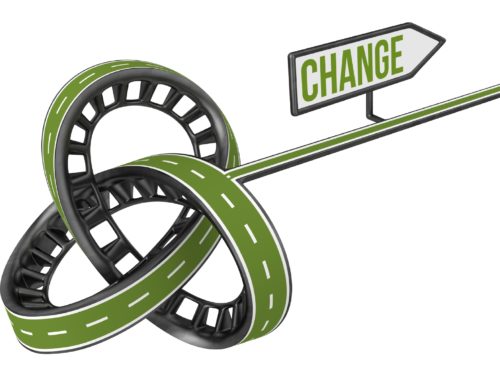Corporate CEOs aren’t paid to solve the worlds’ problems, protect communities, or look out for the long-term well-being of employees or suppliers. Milton Friedman told us that in 1970. Anything you do to protect the interests of other stakeholders is simply a tool. The only true goal is to maximize shareholder value.
And yet, Fortune magazine featured three world-class CEOs on its September 2019 cover with the caption “Profits and Purpose: Can Big Business Have it Both Ways?”
The bulk of its “Change the World” issue was devoted to stories and more than a few ads touting corporate efforts to make the world a better place. The message is clear—corporate America is changing its ways.
We know this because the Business Roundtable, a group whose members include top leaders from companies such as AT&T, Apple, JPMorgan Chase, and Johnson & Johnson, updated their Statement on the Purpose of a Corporation to include a list of stakeholder responsibilities before finally listing “Generating Long-term Value for Shareholders” as number five on the list.
What changed?
There are two answers to this question: Not that much and something very important.
The “not that much” response acknowledges the reality that there have always been successful businesses that defined their responsibilities as broader than just the shareholder.
We’re not talking about Henry Ford’s decision to double workers’ wages to $5 per day back in 2014. That decision received a lot of praise and opened the door to the middle class, but it was done more for financial – not humanitarian – reasons. Besides, Ford’s extra money was really a profit sharing plan more than a pure raise.
Sir Allen Sheppard, then Chairman of the Board for the British conglomerate Grand Metropolitan, articulated the idea that companies should do more than just make a profit in 1990 when he told me:
“At Grand Metropolitan, we measure performance by profitability and return on investment, but there is another significant measure—how we fulfill our responsibility to the communities from which our profits are derived…It is not just sound business sense for us to care about the environment and communities within which we work and live, it is common sense to contribute to the quality of life in our communities.”
The examples of companies large and small seeing their purpose beyond profit are numerous and varied. Here are a few that I’ve included in books and articles over the past 25-plus years.
- James Cash Penney, founder of JCPenney, was so anguished by the failure of a bank on which he was a board member during the Great Depression that he repaid depositors what they had lost from his own funds. Penney was under no legal obligation to do this, but he realized that his name and reputation were factors in luring investors.
- A 1990 Associated Press report described how Gerber Baby Foods retooled an entire plant for a market of one to produce a discontinued product for Raymond Dunn, Jr.
- Bridgeway Capital Management is one of many shining examples of a purpose-driven company that puts people and doing good ahead of a pure profit motivation. Bridgeway gives 50% of its profits to charitable causes.
- Rex Tillerson, then CEO of ExxonMobil, told me in a 2008 interview that the company had invested millions of dollars in preventing malaria. In addition, ExxonMobil employees gave 690,000 volunteer hours to the communities where the company does business that year. The commitment to these efforts remains strong.
- The J&J Credo provided the guiding principles for Johnson & Johnson’s handling of the Tylenol crisis in 1982.
The “something very important” response recognizes the impact of changes in demographics, expectations, technology, and the war for talent.
Rex Tillerson told me back in 2008, “You get portrayals of what business leaders look like and what government leaders look like that are just perverted because so much of it focuses on the exceptions that behave badly. They are convinced that when you get out there in business that it’s a dog-eat-dog world and that all is fair in love and war. That’s just not the way it is.”
Those “youth” to which Tillerson referred are the Millennial generation. It doesn’t matter if he is correct or not. Their perception is that companies need to play a bigger role in solving the world’s problems.
Most important, the numbers are on their side. Millennials are the largest generation in your workplace. They, along with Gen Z that is on their heels, will drive economic decisions for decades to come.
Many of the CEOs that signed on to the Business Roundtable Statement of Purpose are already doing a lot to serve stakeholders. They will continue to lead in this effort. Companies that have only given lip service to the notion of corporate social responsibility will now have to do more. Technology now allows them to look beyond the carefully-crafted copy to find out what is really going on inside your company.
Will it last?
It depends.
The Baby Boomers were supposed to change things. They were the peace and love generation who grew up distrusting government after Watergate and attending the first Earth Day rally to save the planet. Many of them bought into the “greed is good” mentality and stopped worrying about sustainability.
There was a renewed call for more ethical, responsible leadership in the early 1990s. The U.S. economy was coming off a recession and had experienced the savings and loan crisis. Companies like Ben & Jerry’s, the Body Shop, and Whole Foods pioneered the socially-responsible business movement. That was a start, but the movement lost steam.
In the early 2000s, I was asked by a television reporter if Americans had learned their lesson about investing in bubbles after the internet meltdown. My response was, “It is too soon to tell. Let’s see what happens when 401ks are earning 23 percent again.”
That’s how I feel about this iteration of integrity-driven, socially-responsible leadership. Its success depends on what the Millennials and Gen Z do when they can’t afford college tuition for their children and realize that their retirement is not secure. In the end, Maslow was right. Safety and security trump making the world a better place.
Until then, companies might care more, or it could be all PR hype. They certainly don’t care any less. That’s a small victory, and I’ll take it.
Randy Pennington is an award-winning author, speaker, and leading authority on helping organizations achieve positive results in a world of accelerating change. He is author of On My Honor, I Will: The Journey to Integrity-Driven® Leadership. To bring Randy to your organization or event, visitwww.penningtongroup.com , email info@penningtongroup.com, or call 972.980.9857.





